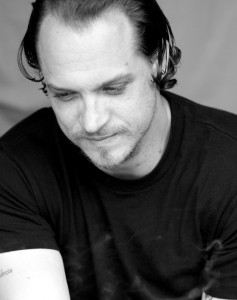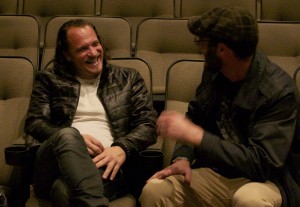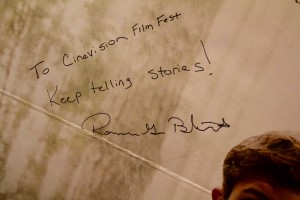Tags
Related Posts
Share This
Ronnie Gene Blevins: Rising Star
Yes, it’s Nicolas Cage. No, it’s not entertainment. It’s a cinematic story adopted from Larry Brown’s 1991 novel, told in a spirit of blunt realism and within a not-so-fictional atmosphere of the gritty South. Involving gusty performances by actors like Ronnie Gene Blevins, the independent feature Joe, starring Nicolas Cage and directed by David Gordon Green, takes bold moves in character development and throws audience expectation out the window.
As a student filmmaker and two-year-projectionist for The Screen, I honestly believe that features like Joe are what the cinematic experience is all about. So you think, Nicolas Cage plus David Gordon Green (known for Elf and Pineapple Express) must equal a high budgeted comedy, right? At least that’s what actor Blevins thought when he was offered the role as Willy Russell, the villain.
To a small but intrigued audience at The Screen May 2, Blevins shared that it was his assumption of a big budget comedy that led him to sending “a larger than life” audition tape to director Green. Perhaps his performance was “against the type of the film,” but Blevins heard back from Green all the same, who said that a larger than life villain wasn’t so far from what he had in mind.
“My brain was kind of scrambled,” Blevins says, explaining how director Green had requested an audition tape while Blevins was working “these long day in the middle of Appalachia.” Green, who had seen Blevins’ short role in The Dark Knight Rises as a bad guy truck driver, was interested in casting Blevins in the character of a Texas lowlife, but it was only after reading the script that the reality of Blevins’ dark and sadistic role in Joe sunk in.
“My resumé includes a lot of bad guys, a lot of evil dudes and episodic [roles],” Blevins says. “This guy straight from the page, there’s just no humanity. So that’s kind of tough.” The challenge, the actor says, then becomes how not to pre-judge Willie and make him one-dimensional but to “find ways, when possible, to put some humor into him…humanity when possible.” It helps, Blevins says, that he’s actually from Texas, where the film was shot and takes place.
Though Blevins’ resumé is already filled with impressive credits (including a successful writing career with productions American Cowslip and Eiderdown Goose), he says that working with Nicolas Cage and David Gordon Green has been a highlight of his career. The actor especially liked the role of Willie Russell because it was a role Green allowed him to develop on his own.
“Green has a way of inspiring performances which is really quite beautiful and poetic,” Blevins says, “and he’s more inclined to shy away from the technical. He lets us do our thing and sees where it lands.”
That atmosphere of improv, Blevins explains, was what kept the mood on set so “light and playful,” despite the darkness of the story. And even if the physical toll was high, like getting whiplash after Joe (Nicolas Cage) beats Willie Russell repeatedly, it was still all about allowing the actors to try anything and everything. Blevins says “there was nothing we could bring up that would be considered wrong.”
And if a bar fight sounds too clichéd for a story about the South, it will make sense when the overload of guns, beer, pit bulls, junk yards, and police cars all pause for those moments of true humanity between Joe and Gary, the boy the character Joe takes under his wing.
Perhaps more intriguing and certainly saddening, when casting the character of Gary’s abusive father, Green hired a homeless man named Gary Poulter, whose one-time acting role is characterized as “one of the great one-shot performances in the history of cinema,” by Rogerebert.com critic Peter Sobczynski.
The term one-shot performance was used, Blevins explains, because two months after the film’s wrap, Poulter was found dead, face down in a river, the same way his character dies in the film.
“He was a sweet sweet man,” Blevins says, “who was really given a shot at redemption. When [Green] and [Cage] came to him and said, ‘hey do you want to play this part?’ He was up for it.” Blevins says that despite Poulter’s heavy dependance on alcohol and a seizure before a shoot day, the one-time actor sobered up and gave a “brilliant” and “perfect” performance.
“I think, such is the way of the industry,” Blevins says. “We wrap and there’s like a year where everything gets underway, post production, and by the time it comes out, it’s a year later. I think [Poulter] kind of felt that all encompassing rush of being in the film and then it kind of went away. He hadn’t talked to anyone in a while. He obviously started drinking again. He never got an opportunity to see the finished product, never got an opportunity to see all the accolades that he’s been getting.”
On a brighter note, Blevins acknowledges the bright future of their youngest cast member, Tye Sheridan, whose movie credits include Mud and The Tree of Life.
At age 17, Blevins says Sheridan is “a natural…an incredible young man and a friend. Even though this is his third film, I had known his work coming into doing the film.” Blevins adds that as a native to Texas and a hunter, Sheridan is the kind of rising star that “shuns everything Hollywood.”
Overall, the Q/A crowd at The Screen was the type of audience who could appreciate the authentic story Green told. “It’s like you’re getting stuck in the mud,” a patron commented, “and I didn’t want to go down any further, but I couldn’t help it.”
Certainly, Joe demonstrates how great a performer Nicolas Cage can be when given the freedom of improvisation. And for those who walked out of the theater because they believed it to be “too violent” (and there were a few) perhaps they weren’t ready for that Southern realism.
“That’s exactly what David wanted,” Blevins says, “very naturalistic. It’s bold because in this day and age everything is all big budget, instant gratification and in your face. It’s bold, I think, for the filmmaker to ask your audience to hold on while these characters get developed, but I think that when we do hang on, as the audience, it’s that much more rewarding. We’re led to something more gratifying.”









 Jackalope Magazine is the student magazine of Santa Fe University of Art and Design. Building on the interdisciplinary nature of our education, we aim to showcase the talent of our university and character of our city.
Jackalope Magazine is the student magazine of Santa Fe University of Art and Design. Building on the interdisciplinary nature of our education, we aim to showcase the talent of our university and character of our city.
Recent Comments